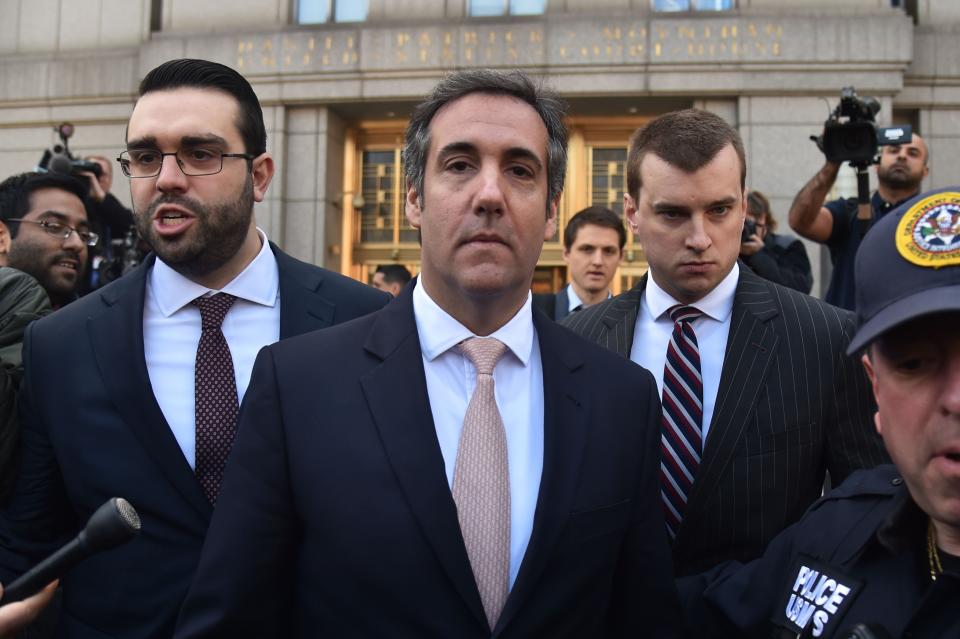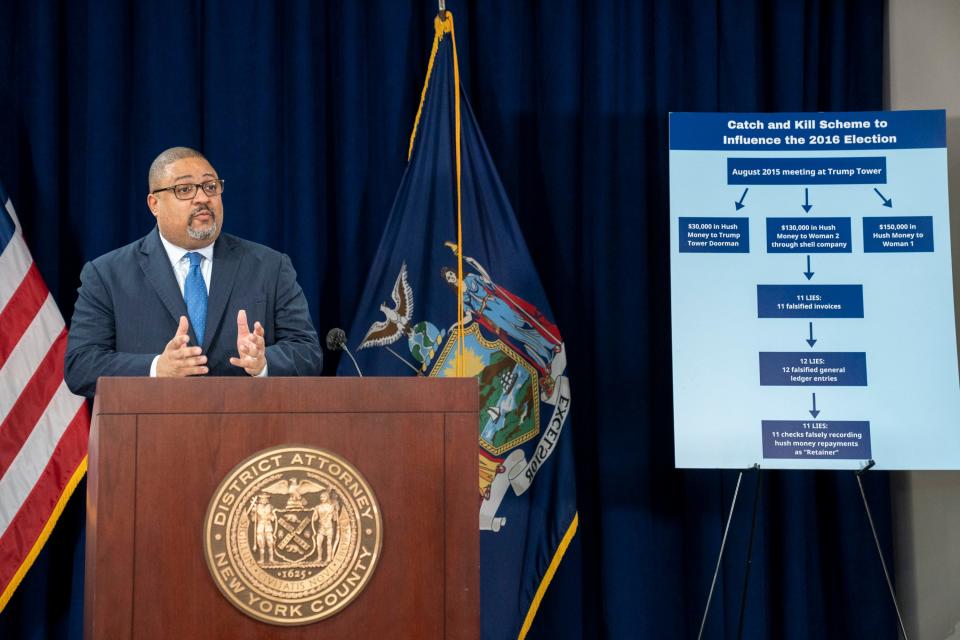What happens if Trump is found guilty in hush money case? Prison is certainly an option.
Former President Donald Trump could theoretically face more than a decade in prison if he is convicted on all counts in his New York criminal hush money trial.
But most legal experts who spoke to USA TODAY said such a dramatic outcome is unlikely. Instead, he would probably be sentenced to something between probation and four years in prison. And he would likely still be out, free to campaign for president as the presumptive or actual 2024 Republican nominee, while his all-but-certain appeal was pending.
A jury of 12 Manhattan residents started deliberating on Wednesday.
Trump faces 34 felony counts of falsifying business records to cover up a hush money payment to adult film actress Stormy Daniels. Each count carries a maximum sentence of four years.
More: Trump hush money trial jury deliberations begin: when we might we get a verdict
While Trump could in principle be sentenced to serve multiple counts consecutively, several experts said that is unlikely because he has no felony criminal record and the charges don't involve allegations of physical violence.
On the other hand, Trump has tested boundaries and feuded with the judge who may determine his fate.
Trump has antagonized Judge Juan Merchan
Trump's sentence would be decided by Judge Juan Merchan, who has grown exasperated by the former president's pretrial behavior. Merchan expanded a gag order this month after Trump attacked the judge's daughter on social media over her marketing work with Democratic candidates, including posting a photo of her. Merchan said Trump has a history of attacking the family members of judges and lawyers in his legal cases.
"The average observer, must now, after hearing Defendant's recent attacks, draw the conclusion that if they become involved in these proceedings, even tangentially, they should worry not only for themselves, but for their loved ones as well," Merchan wrote in his gag order decision.
John Moscow, a New York lawyer who spent 30 years in the Manhattan District Attorney's Office, told USA TODAY that type of behavior could worsen any sentence Trump faces.
"If I were representing somebody in (Trump's) position, I would suggest to him that the judge is the one who imposes sentence and he ought to be careful," Moscow said.
If Merchan did consider a hefty sentence, it wouldn't be the first time he has taken a harsh view about behavior in Trump's orbit.
In 2023, Merchan was forced to sentence former Trump Organization chief financial officer Allen Weisselberg to only five months in jail because Merchan had previously accepted a plea bargain agreement between Weisselberg and prosecutors specifying that jail term. Weisselberg pleaded guilty to tax and record falsification charges and agreed to testify against the Trump Organization at trial in order to get that sentence.
The judge said, however, that he "would be imposing a sentence much greater than that" had he not accepted the plea bargain before hearing all the evidence at the trial. Without the plea deal, Weisselberg could have faced many years in prison.
What is Trump charged with?
Trump has pleaded not guilty to all counts in the case, which focuses on whether he falsified business records to cover up reimbursements to his former lawyer, Michael Cohen, for a $130,000 hush money payment to Daniels. Daniels has said she had a sexual encounter with Trump soon after Melania Trump gave birth to their son, Barron Trump. Trump denies the claim.

In order to secure felony convictions, Manhattan District Attorney Alvin Bragg's office must convince a 12-person jury that Trump falsified the records in order to commit or conceal another crime. In this case, Bragg argues Trump was trying to conceal a federal campaign finance law violation by falsely recording his reimbursements to Cohen as payments for legal services. The federal violation was a limit-exceeding contribution to Trump's 2016 presidential campaign, as the payment was allegedly designed to keep Daniels' story from hurting the then-Republican nominee's election prospects. Bragg also alleges Trump was trying to conceal a plan to violate New York tax and election laws.
Nothing in the Constitution prevents Trump from becoming president even if he is convicted or sentenced to prison. If he won the election, however, courts may delay any prison time until after his term in office expires.
What is the maximum possible sentence?
The 34 felony counts Trump faces are classified as "Class E felonies" under New York law – the lowest level felony in the state. The maximum penalty on each count is four years of prison, and a judge would have discretion over whether to order Trump to serve sentences on each count at the same time or one after the other. However, New York caps such sentencing for Class E felonies at 20 years.

In addition, New York judges often impose sentencing ranges, where an incarcerated person becomes eligible for parole at the low end of the range. For Class E felonies, the lowest end of a range would be one-and-a-third years per count, while the highest would be four years. Good behavior in jail or prison can speed things up even more.
A sentence limited to probation?
Merchan would also have discretion to order a fixed sentence of less than those ranges, including probation.
That's what Mitchell Epner, a New York lawyer with decades of criminal law experience, expects would happen even if Trump were convicted on all counts. Epner noted the felony charges aren't violent and don't involve drugs.
"With a defendant who has no prior criminal record, my absolute expectation would be a sentence of probation," Epner told USA TODAY.
Epner wasn't alone in thinking that could be the sentencing outcome.
"This is a case that does not involve any physical violence, and it doesn't – there's not sort of a 'named victim,' so to speak – and so the court is going to take that into consideration," Anna Cominsky, who directs the Criminal Defense Clinic at New York Law School, told USA TODAY.
"In addition, I think it is unlikely that he would be sent to prison given who he is, given both the fact that he has no criminal record, and there is no getting around the fact that he is a former president of the United States," Cominsky said.
Incarceration a real possibility
Norman Eisen, a Brookings Institution senior fellow who served as special counsel to the House Judiciary Committee during Trump's first impeachment, thought a sentence that includes some incarceration is likely.
Eisen co-authored a report looking at sentencing for other defendants with no criminal history who were convicted of falsifying business records in New York. There, he noted one construction executive was sentenced in 2015 to spend two days each week in jail for a year for falsifying records to conceal payments in a bribery scheme. In 2013, two corporate executives were ordered to spend four to six months in jail for falsifying records to misclassify their salaries as expenses under their employer's larger bribery and fraud scheme.
"I think he's likely to face a sentence of incarceration if he's convicted," Eisen told USA TODAY.

Cominsky said the evidence Merchan hears at trial could also influence his thinking when it comes to sentencing.
"Often you'll hear judges refer to testimony at trial, evidence that was presented at trial, and say, 'This is why I'm imposing this sentence, because I heard from this particular witness or I saw this particular piece of evidence,'" Cominsky said.
Moscow pushed back against the assumption that Trump's sentences on each count would run simultaneously, instead of being stacked on top of each other. Just as a judge may take into account that a defendant has won a Nobel Peace Prize or lifted orphans from poverty, the judge may look at significant evidence of bad acts, Moscow said.
"When you start attacking the judge's daughter, and making her out to be a target, you have just breached the normal rules," Moscow said.
Trump has also posted a photo of himself wielding a bat, with his eyes directed toward an adjacent photo of Bragg, among other attacks on the district attorney. Bragg's office has received thousands of harassing emails, calls, and texts – including death threats – after Trump's social media attacks, it said in a court filing.
Diana Florence, a New York lawyer who spent decades in the Manhattan District Attorney's office, said Merchan's sentence would need to have some relation to what other white-collar defendants in similar cases have received, and she would be surprised if someone had ever gotten a sentencing range for falsifying business records with a minimum of 10 years or more.
Such a long sentence "would be very, very, very, very unusual, and if Judge Merchan wanted to make a point and do that, I highly doubt the appellate division would allow that to stand," she said. "It's just too much time for the conduct."
However, Florence added that a reasonable sentencing range could include a minimum period of more than a year incarcerated.
Sentencing someone with Secret Service protection?
Contemplating any jail or prison sentence would take Merchan into unchartered territory: Trump is the first former president ever criminally charged, and the Secret Service provides him with around-the-clock security.
But avoiding a sentence of incarceration on that basis risks undermining the idea of equal treatment under the law, Moscow suggested.
"If I were the judge ? and I don't know what a judge would do in this case ? I would reject out of hand the concept that because he was once president, and because as a matter of policy the Secret Service guards former presidents, that therefore he can't go to jail," Moscow said.
The question would then become how to reconcile equal treatment with ensuring a former president's security, according to Moscow. The judge could get creative, for example by ordering the former president to stay in a hotel wing or at a military base, where he is isolated just like any other prisoner but still has Secret Service protection.
"You can structure things to achieve the proper result without conceding that the defendant has the upper hand," Moscow said.
Chances of immediate prison? 'Less than 1%'
Many convicted defendants are "remanded" pending sentencing, a process in which they are taken into custody while they await their sentence, Florence said.
But Florence didn't expect Merchan to give that order when it comes to Trump, and even if Merchan did, Trump would likely be able to get bail set by an appeals court in the thousands of dollars to stay free during his appeal. That's all the more likely if Trump receives a low sentence, since the appeal could take longer than his actual sentence, she said.
"The chances of him going to prison immediately, even if he's convicted in whatever, six weeks from now or whenever, are I would say less than 1% because he would immediately be released on bail pending appeal," according to Florence.
Eisen agreed Trump probably wouldn't be incarcerated by Election Day, even if he's convicted on all counts.
"I think he's extremely unlikely to be forced to serve that sentence pending appeal," Eisen said.
This article originally appeared on USA TODAY: Will Trump go to prison if he is convicted in hush money trial?
